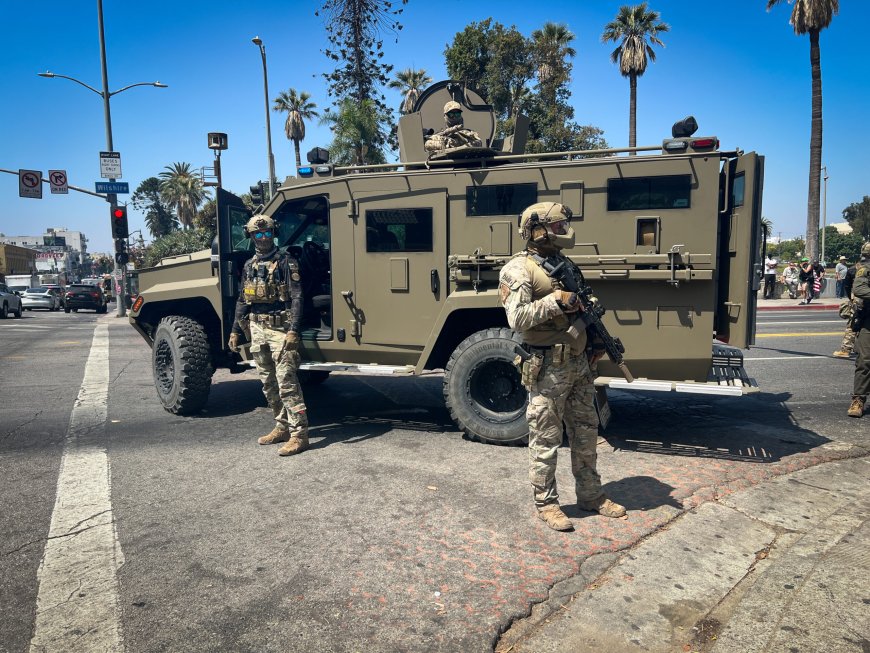Federal Crackdown in Washington, D.C. Draws Sharp Reactions Amid Rising Juvenile Crime
Federal agents and National Guard troops are deployed in Washington, D.C., to combat rising juvenile crime, triggering debates over Trump’s comments on federal control of the capital.

Washington, D.C. —
A sweeping federal crackdown is underway in the nation’s capital as National Guard units, FBI agents, and Department of Homeland Security personnel flood into Washington, D.C., in a bid to curb what officials describe as a dangerous spike in juvenile-related crime. The operation, announced late Friday, comes just days after President Donald Trump reignited political tensions with remarks suggesting that federal control over the capital may be necessary to restore order.
Federal officials have not provided exact troop or personnel numbers, but local reports indicate dozens of tactical units are already on patrol in key neighborhoods identified as “crime escalation zones.” This marks one of the most significant multi-agency federal deployments in D.C. since the 2020 civil unrest.
Why the Crackdown is Happening
According to D.C. police statistics, juvenile crime—including armed carjackings, robberies, and assaults—has surged by nearly 20% over the past 12 months. City officials say much of the rise is linked to organized youth groups targeting high-value areas.
In a press briefing, DHS Secretary Alejandro Mayorkas stated,
“We are here to support the local government in ensuring public safety, particularly for residents who have been disproportionately affected by violent crime.”
The decision to deploy the National Guard alongside federal law enforcement is intended to create a visible deterrent while enabling rapid response to incidents. Critics, however, warn that such moves risk escalating tensions between law enforcement and the community.
Trump’s Remarks Add Political Fuel
President Trump, in an interview earlier this week, floated the idea of placing D.C. under full federal oversight, claiming local leadership had “failed to protect citizens from lawlessness.” His comments were met with immediate backlash from Mayor Muriel Bowser, who called the suggestion “an insult to the city’s autonomy.”
Bowser added,
“We have the tools and the will to protect our communities. What we need is constructive partnership, not political theater.”
Political analysts note that the debate over D.C.’s governance is not new, but this latest surge in crime—and the dramatic federal response—has reignited arguments over whether the capital should retain its unique home-rule arrangement.
Community Response: Fear, Frustration, and Fatigue
While some residents have welcomed the increased security presence, others see it as a step toward federal overreach. Several community advocacy groups have urged restraint, warning that aggressive policing could worsen already strained relationships between youth and law enforcement.
Local business owners in crime-affected districts told reporters they are cautiously optimistic, citing the need for stability to keep customers safe. However, they also voiced concerns that long-term solutions—such as investment in youth programs and economic opportunities—are being overshadowed by short-term enforcement.
Historical Context of Federal Involvement
Washington, D.C., has a unique legal status that allows Congress to intervene in local governance. Federal law enforcement agencies already have jurisdiction over certain crimes, but large-scale joint operations like this are rare outside of national emergencies.
Past examples, such as the 1990s anti-drug crackdowns, show mixed results: while violent crime temporarily decreased, community relations often suffered lasting damage. Experts say the outcome of the current operation will depend on whether federal and local authorities can coordinate effectively without alienating residents.
What Happens Next
The Justice Department has confirmed that the crackdown will continue “for as long as necessary,” with weekly reviews to assess progress. Meanwhile, the White House has signaled that it will closely monitor D.C.’s crime rates and may expand operations if deemed necessary.
For deeper context on federal law enforcement roles, see official resources from the U.S. Department of Justice and updates from the Federal Bureau of Investigation.









